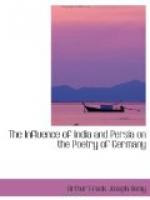CHAPTER VIII.
RUeCKERT.
His Oriental Studies—Introduces
the Ghasele—Oestliche Rosen;
Imitations of
Hafid—Erbauliches und
Beschauliches—Morgenlaendische
Sagen und Geschichten—Brahmanische
Erzaehlungen—Die
Weisheit des Brahmanen—Other Oriental
Poems.
When speaking of the introduction of the gazal-form into German literature mention was made of the name of the man who is unquestionably the central figure in the great Oriental movement which is occupying our attention. Combining the genius of the poet with the learning of the scholar, Rueckert was preeminently fitted to be the literary mediator between the East and the West. And his East was not restricted, as Goethe’s or Platen’s, to Arabia and Persia, but included India and even China. He is not only a devotee to the mystic poetry of Rumi and the joyous strain of Hafid, but he is above all the German Brahman, who by masterly translations and imitations made the treasures of Sanskrit poetry a part of the literary wealth of his own country. To his productivity as poet and translator the long list of his works bears conclusive testimony. In this investigation, however, we shall confine ourselves to those of his original poems which are Oriental in origin or subject-matter. A discussion of the numerous translations cannot be undertaken in the limited space at our disposal.
Like Goethe and Platen, Rueckert also owed to Hammer the impulse to Oriental study. His meeting with the famous Orientalist at Vienna, in 1818,[145] decided his future career. He at once took up the study of Arabic, Persian and Sanskrit, and with such success that in a few years he became one of the foremost Orientalists in Europe.
The first fruit of these studies were the Gaselen which appeared in the Taschenbuch fuer Damen, 1821, the first poems of this form in German literature.[146] They have been generally regarded as translations from the divan of Rumi, but this is true of only a limited number; and even these were probably not taken directly from the Persian, but from the versions given by Hammer in his Redekuenste.[147] As a matter of fact, only twenty-eight—less than one-half of the Gaselen,—can be identified with originals in Hammer’s book, and a comparison of these with their models shows with what freedom the latter were handled.[148] Furthermore in the opening poem, (a version of Red. p. 187, “So lang die Sonne”) the last couplet:
Dschelaleddin nennt sich das
Licht im Ost,
Dess Wiederschein euch zeiget
mein Gedicht,
is original with Rueckert, and clearly shows that he himself did not pretend to offer real translations. The majority of poems are simply original gazals in Rumi’s manner.
Dschelaleddin, im Osten warst
du der Salbenhaendler,
Ich habe nun die Bude im Westen
aufgeschlagen.[149]




